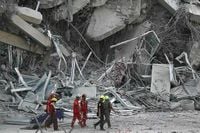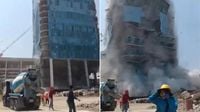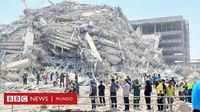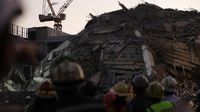A powerful 7.7 magnitude earthquake struck central Myanmar on March 28, 2025, causing widespread devastation and loss of life. The epicenter was located near Mandalay, one of the country’s largest cities, and the tremors were felt as far away as Thailand, China, and India. Reports indicate that at least 20 people have died and over 300 have been injured in Myanmar alone, with the situation still developing as rescue efforts continue.
The earthquake hit at 12:50 PM local time (6:20 GMT) and was followed by a strong aftershock measuring 6.4 just 11 minutes later. The U.S. Geological Survey (USGS) has estimated that hundreds could be dead as a result of the quake, with ongoing assessments of the damage.
In Mandalay, the local hospital, which has a capacity of 1,000 beds, was overwhelmed with casualties. Doctors reported that the generators failed during the quake, forcing them to treat patients in the streets. Eyewitness accounts describe scenes of chaos, with numerous buildings collapsing, including parts of the historic Mandalay Palace and a mosque that tragically collapsed during Friday prayers, leading to multiple fatalities.
As rescue teams work tirelessly, they are facing significant challenges. Roads leading to the hospital were congested, and many areas remain inaccessible due to damage. A resident from Naipyidó, the capital of Myanmar, expressed the community's distress, stating, "All the buildings are completely destroyed... It has been chaos." This sentiment reflects the growing anxiety among the population as they await news of loved ones.
In Thailand, the earthquake caused a 30-story building under construction in the Chatuchak district of Bangkok to collapse. Reports indicate that at least three people have died and approximately 81 workers are still trapped under the rubble. The Thai government has declared a state of emergency in the capital, urging residents to remain vigilant for potential aftershocks. Prime Minister Paetongtarn Shinawatra interrupted her visit to Phuket to hold an emergency meeting regarding the disaster.
The tremors were so intense that they caused panic in Bangkok, with people rushing into the streets, many still in their hotel robes and swimsuits. Videos shared on social media showed skyscrapers swaying, with water from rooftop pools spilling over. The National Institute of Emergency Medicine in Thailand reported that 50 people were injured in the collapse, with five in critical condition.
In Myanmar, the military junta has declared a state of emergency in six regions, including Mandalay and Sagaing. They have requested international assistance, acknowledging the scope of the disaster. A spokesperson for the junta stated, "The damage is enormous," and emphasized the urgent need for humanitarian aid.
International response has begun to materialize, with countries like India and France offering assistance. The European Union has also expressed readiness to provide emergency aid, with the European Commission's President, Ursula von der Leyen, stating that European satellites are already helping first responders assess the situation. Meanwhile, Pope Francis has sent prayers and condolences to the victims and their families, emphasizing the importance of humanitarian support.
The earthquake struck a country already grappling with significant humanitarian challenges, with over three million people internally displaced due to ongoing conflict. Joe Freeman, an expert from Amnesty International, highlighted the precarious situation, stating, "This earthquake could not have come at a worse time for Myanmar. Over a third of the population needs humanitarian assistance this year."
Historically, Myanmar is located in a seismically active region due to the collision of tectonic plates, and while earthquakes are not uncommon, this event is among the most powerful recorded in recent years. The last significant earthquake in the region occurred in 2016, measuring 6.8 and resulting in several fatalities.
As the situation continues to evolve, the focus remains on rescue and recovery efforts, with many fearing that the death toll could rise significantly as more information becomes available. The international community is closely monitoring the developments, and humanitarian organizations are preparing to mobilize resources to assist those affected.
The aftermath of the earthquake will likely have long-term implications for Myanmar, a nation already facing economic and social challenges. The need for coordinated international aid and a commitment to supporting the affected communities will be critical in the coming days and weeks.









